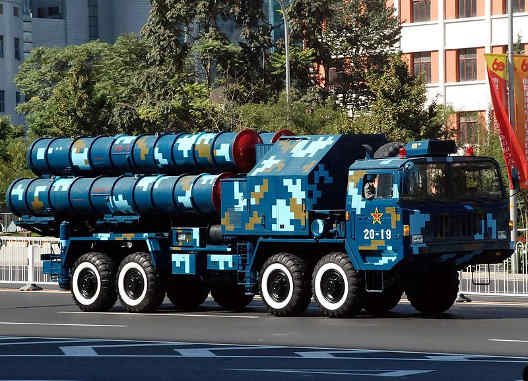![The Turks will be purchasing the FD-2000, the export version of the Chinese S-300 (HongQi 9 [HQ-9]) launcher pictured here during China's 60th anniversary parade, 2009. (Photo: Wikimedia/Jian Kang/CC License)](http://www.atlanticcouncil.org/wp-content/uploads/2013/11/20131101_wikimedia_FD2000.jpg) After long deliberation, Turkey announced September 26 its selection of China’s FD-2000 air and missile defense system over competitors from the United States (Patriot), Europe (SAMP/T), and Russia (S-400).
After long deliberation, Turkey announced September 26 its selection of China’s FD-2000 air and missile defense system over competitors from the United States (Patriot), Europe (SAMP/T), and Russia (S-400).
Ankara decided upon China for three reasons.
First, the Chinese bid reportedly came with a 25 percent discount. The difference $1 billion, a serious chunk of change.
Second, the Chinese promised to transfer relevant technologies to Turkey. Turkey has sought technologies to support a diversified defense industry since Turgut Özal led it three decades ago. Prime Minister Recep Tayyip Erdoğan’s government has emphasized this and sees it as essential for the country’s long-term competitiveness. The inability of US firms to meet Turkey’s terms has limited their access to its defense market for years.
Third, Turks view the United States as a defense supplier of dubious reliability. The post-1974 Cyprus invasion arms embargo is remembered like it happened yesterday, stoked by recent opposition to the sale of Predators to the Turkish military. US licensing and other delays have held up delivery of four Boeing airborne early-warning and control (AEWC) aircraft, the last new system purchased from the US – in 2003. Similar licensing issues have compromised such other projects as the Turkey component of the F-35 Joint Strike Fighter. Going Chinese was a way to express frustration with the defense industrial relationship, not to vent over tensions regarding Syria, Turkish-Israeli relations, or anything to do with Gezi Park.
On the merits and assuming the deal gets consummated, Ankara miscalculated. The FD-2000 price may have been lower, but one gets what one pays for, and the Chinese system lacks comparable, battle-tested capabilities. Chinese promises of tech transfer may disappoint as well. Licensing and defense industrial cooperation won’t get easier when the Chinese embed themselves in Turkey’s aerospace industries. A separate stance on the defense and security challenge the Alliance will face in coming decades will not help Turkey.
Will Turkey ever get the Chinese system? Perhaps not. Turkish leaders have recently hedged about what the ultimate purchase might be. The three competing systems’ backers have been invited to submit improved offers by early next year. The Executive Committee’s choice of the Chinese system is the first of several thousand steps to finalize the terms, a contract, resolve other issues, and complete delivery. The Turks bargain ruthlessly and nearly interminably on defense procurement matters. How the Chinese will fare has to be an open question.
The casualty of Turkey’s decision is that the country is unlikely to have a good air and missile defense system anytime soon. That may not have been entirely unintentional: Ankara may well want the system only on its perhaps exaggerated terms – and if not on those conditions, then not at all. That won’t be good for Turkey, NATO’s common defense against missile threats, or Allied interests.
Going forward, strengthening the North Atlantic Alliance and Turkey’s connection to it and to the United States should be the priority, not whining about ulterior Turkish motives. NATO members should be direct about the issues associated with a nonstandard air and missile defense system. Washington should work to prolong the talks, find creative ways to address Turkey’s economic development concerns, and work on mechanisms to resolve the underlying problems. The defense trade cooperation treaties with the UK and Australia may be too ambitious a model. However, some framework along these lines may be crucial for ensuring US defense suppliers have access to the Turkish military market and for ensuring that this piece of the bilateral relationship supports our security and foreign policy priorities in the most volatile and dangerous part of the world.
Ross Wilson is director of the Dinu Patriciu Eurasia Center.
Image: The Turks will be purchasing the FD-2000, the export version of the Chinese S-300 (HongQi 9 [HQ-9]) launcher pictured here during China's 60th anniversary parade, 2009. (Photo: Wikimedia/Jian Kang/CC License)
